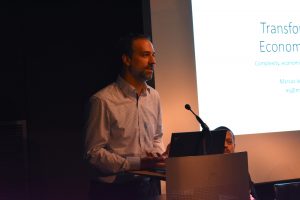 I had the honour and pleasure to be a speaker on a panel last week at the Royal Society of the Arts (RSA) in London. The event was titled “Refreshing Development: Making the Case for New Economic Thought in Global Development Policy”. It was part of a whole series of events 10 years after the economic crash in 2007 and supported by the Alumni network of the Hertie School of Governance in Berlin.
I had the honour and pleasure to be a speaker on a panel last week at the Royal Society of the Arts (RSA) in London. The event was titled “Refreshing Development: Making the Case for New Economic Thought in Global Development Policy”. It was part of a whole series of events 10 years after the economic crash in 2007 and supported by the Alumni network of the Hertie School of Governance in Berlin.
My presentation was about transformational economic change and in it I tried to convey the basic ideas on how change happens in the economy, wrapped in the example of the “Growing Rubber Opportunities” (GRO) Project I have been supporting over the last four years in Myanmar.
- Economies are not like machines where individual parts that are broken can be removed, fixed and put back into the machine. Economies are complex adaptive systems with many interconnected and interrelated moving parts, where reality is constantly emerging from the interplay of the various moving parts.
- Understanding the economy as a complex evolving system requires us to rephrase the quest for transformational change from fixing individual problems in a reductionistic way (for example finding a solution that solves the lack of information provision to farmers) to enabling and shaping the economic evolution (for example by strengthening institutions that are able to assess changing information needs and dynamically respond to them).
- Economic evolution needs to happen evenly in three different domains, namely physical technologies, social technologies and economic technologies. Physical technologies are the objects that allow us to transform things, for example produce rubber sheets from liquid rubber. Social technologies are the ways in which people are able to get organised into networks, communities or hierarchies and how these are governed, for example rubber processing companies or the rubber value chain. Economic technologies bring physical technologies and social technologies together in business plans or organisational strategies in the real world.
- Economic evolution also needs to happen on four different layers in society, the micro, meso, macro and meta layer (a framework we call Systemic Competitiveness). While the micro and macro layers are quite well known from classical economics, the meso and meta layer are relatively new additions coming from new insights out of fields as diverse as complexity economics and political sciences. The meso thereby represents targeted policies and organisational strategies to address temporary and persistent patterns of underperformance. The meta represents the social framework conditions that guide decisions about fundamental economic alternatives.
I then gave a couple of examples how these ideas are put into practice ein the GRO project in Myanmar.
You can download my slides here.
